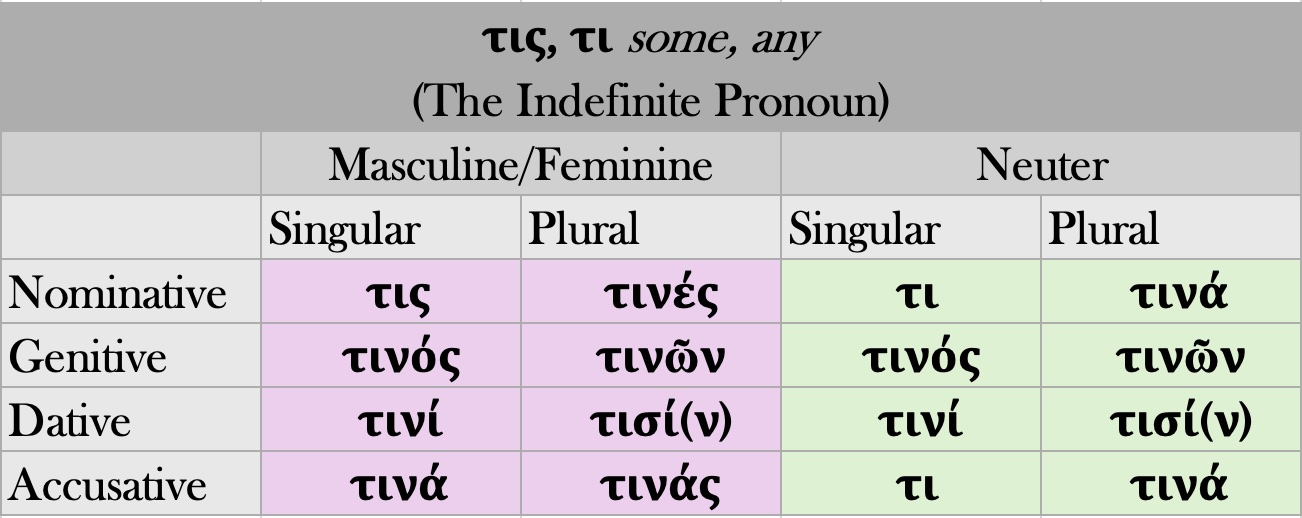12.7 While most pronouns follow the pattern of the definite article, the indefinite pronoun, some/any, uses the endings of 3rd DECLENSION NOUNS, the noun endings that we learned earlier. As a result, masculine and feminine endings are identical.
This pronoun has the stem τιν-. When the endings involve adding a sigma to the stem (nom. sing. = –ς, dat. plu. = –σι), sigma wins the battle, and the –ν disappears from the end of the stem. Remember that for the 3rd declension, the neuter nominative and accusative singular has no ending. For this pronoun, the result – τιν – is always shortened to τι (S 334, G 217, 219).
12.8 As you review the paradigm, note the accent! It is placed on the ultima to remind us that the indefinite pronoun is ENCLITIC. It follows the regular enclitic accent rules, though note that the genitive plural, if accented, receives a circumflex, not an acute. Since an enclitic leans on the preceding word for its accent, the indefinite pronoun can never come first in a sentence, and depending on the accent of the preceding word, may not even have an accent.
- διδόασί τινες ὕδωρ τοῖς παισίν.
- Some people are giving water to the children.
- οἱ ἄρχοντες διδόασί τι τοῖς παισίν.
- The rulers are giving something to the children.
12.9 Indefinite pronouns are often found in negative sentences. Consider the following examples.
- δίδωσιν οὔ τις τὸ ὕδωρ τοῖς παισίν.
- No one (not anyone) is giving water to the children.
- οἱ ἄρχοντες οὐ διδόασί τι τοῖς παισίν.
- The rulers are not giving anything to the children.
- The rulers are giving nothing to the children.
12.10 When τις, τι follows a noun it agrees with (in gender, number and case), it becomes an ADJECTIVE that makes the noun indefinite. In such instances, the noun would not have a definite article.
- ἄρχοντές τινες διδόασι τὸ ὕδωρ τοῖς παισίν.
- Some rulers are giving water to the children.
12.11 The Indefinite Relative Pronoun
Adding τις, τι as a suffix to the relative pronoun (ὅς, ἥ, ὅ) makes the relative pronoun indefinite. The pronoun translates as anyone who/anything which/anything that. Consider the following sentence.
- ὅστις δίδωσι τὰ χρήματα τοῖς παισίν, ἀφίησι τὰ χρήματα.
- Anyone who/Whosoever gives money to the children is throwing the money away.
To form this pronoun, notice that Greek inflects both the relative pronoun and its indefinite suffix (S 339, G 220).
12.12 Note that the neuter nominative and accusative singular is usually written as two words: ὅ τι. This is to distinguish this form from ὅτι, meaning because.
- ὅ τι οἱ ἄρχοντες διδόασι τοῖς παισίν…
- Whatever the rulers are giving to the children…
- ὅτι ἀποδιδόασιν οἱ παῖδες τὰ χρήματα…
- Because the children are giving the money back…
Note also that although the enclitic suffix τις, τι has been added to the relative pronoun to form one word, the relative pronoun is accented as though the enclitic is still a separate word (S 186). This situation results in forms such as ὧντινων, where the antepenult now can have a circumflex!




